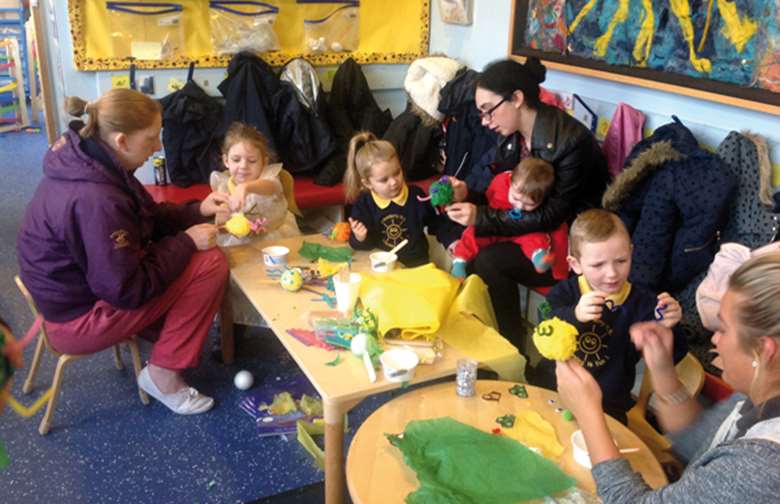How pre-school children profit from professional parental support
Emily Rogers
Tuesday, March 15, 2016
Programme improves outcomes for nursery children by helping parents support their early learning and development.

Project
Our Shared Vision
Funding
Nearly £1.2m from the Big Lottery Fund’s Live and Learn programme from November 2009 until April 2016
Background
Early years professionals working in deprived neighbourhoods of Belfast were concerned about the number of children starting nursery with poor communication, language and behaviour.
In 2008, a partnership led by Belfast Education and Library Board – now the Education Authority, Belfast Region – sought funding for a parent support programme to address these issues. Our Shared Vision launched in November 2009.
Action
The programme involves Belfast nurseries Edenderry, Arellian, Our Lady’s and St Bernadette’s, as well as Irish-language nursery Naíscoil an tsléibhe Dhuibh. A pre-nursery version has also been offered at Whiterock Children’s Centre and South Belfast Sure Start.
Parents of children starting nursery in September are introduced to the setting’s “family learning worker” at summer open days. These workers may also visit families at home. Parents are given induction packs containing crayons and craft materials to stimulate home learning. They also complete a questionnaire, setting down what they would like to achieve for themselves and their child, the activities that would interest them and any issues they would like support with such as developing children’s communication skills or improving routines and behaviour.
Parents’ responses shape a menu of activities available at each nursery and tailored to families’ needs and interests. These are delivered by family learning workers or by partner organisations and may include workshops on first aid, healthy eating, stress management, child development, and adult learning opportunities. The activities include parenting courses such as the 10-week Parents as Co-Educators course.
Parents are also invited to join children for nursery sessions and various activities, which demonstrate things they can replicate at home. Learning sacks are distributed, containing books, a learning activity or toy and tips on how to use them.
Programme co-ordinator Joanne Sweeney says families are from communities affected by high unemployment levels, paramilitary violence, drug and alcohol misuse and poor mental health. “Many have had a poor experience of education, so there’s a certain suspicion towards schools,” she explains. “This is about empowering them to see themselves as their child’s primary educator and showing them the amazing things they can do for their early learning and development.”
The key to the programme’s success is the relationships its four family learning workers build with parents, says Sweeney. They spend the first month getting to know parents, offering a listening ear and advice on issues such as bedtime routines or behaviour. The workers provide one-to-one support, encouraging parents to engage in programme activities and signposting them to specialist services such as counselling. They can also play an intermediary role between parents and teachers and advocate for parents at special educational needs meetings, helping them understand and contribute to the process.
Around 90 per cent of parents at participating nurseries get involved in the programme, which has reached at least 2,500 parents.
Outcome
Our Shared Vision has increased parents’ confidence as co-educators, by boosting their knowledge of child development and how to engage more effectively with their children, according to a January 2016 report compiled by Quaesitum Independent Evaluation and Research.
Teachers tracked 205 children across the five participating nurseries in 2013/14. Of those, 172 (84 per cent) made progress in social and emotional behaviour while 177 (86 per cent) made progress in language, communication, understanding and concentration. One primary school head quoted in the evaluation report said children who had taken part in the scheme “stand a mile apart” from others entering school.
If you think your project is worthy of inclusion, email supporting data to derren.hayes@markallengroup.com




